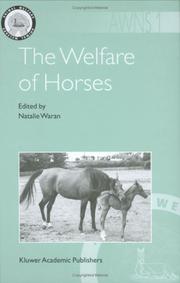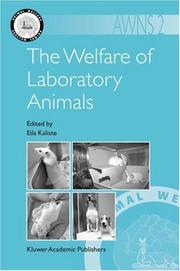| Listing 1 - 3 of 3 |
Sort by
|
Book
ISBN: 9789048136506 9789048136490 Year: 2010 Publisher: s.l. : Springer science & Business media
Abstract | Keywords | Export | Availability | Bookmark
 Loading...
Loading...Choose an application
- Reference Manager
- EndNote
- RefWorks (Direct export to RefWorks)
Describes the welfare implications of keeping wild and domestic birds in captivity. The environmental and social requirements of various avian species are discussed and suggestions made for appropriate housing and management techniques. Particular attention is paid to human-bird interactions and their impact on the behavior and welfare of the birds involved. Training methods for companion birds are also described. Possible future trends in keeping birds in captivity are discussed in relation to evolving laws and codes for both wild and domesticated birds and in the light of developing attitudes to animals.
Life Sciences. --- Zoology. --- Animal Genetics and Genomics. --- Animal Physiology. --- Behavioural Sciences. --- Veterinary Medicine. --- Life sciences. --- Veterinary medicine. --- Animal behavior. --- Animal genetics. --- Sciences de la vie --- Médecine vétérinaire --- Animaux --- Zoologie --- Génétique animale --- Moeurs et comportement --- 590.2 --- dierenwelzijn (lt) --- vogels (lt) --- Animal welfare --- Aviculture --- Bird culture --- Birds --- Culture, Bird --- Rearing of birds --- Animal culture --- Abuse of animals --- Animal cruelty --- Animals --- Animals, Cruelty to --- Animals, Protection of --- Animals, Treatment of --- Cruelty to animals --- Humane treatment of animals --- Kindness to animals --- Mistreatment of animals --- Neglect of animals --- Prevention of cruelty to animals --- Protection of animals --- Treatment of animals --- Welfare, Animal --- Culture --- Husbandry --- Rearing --- Abuse of --- Social aspects

ISBN: 9781402007668 1402007663 9780306482151 1402061420 0306482150 1280957840 Year: 2002 Publisher: Dordrecht ; Boston : Kluwer Academic Publishers,
Abstract | Keywords | Export | Availability | Bookmark
 Loading...
Loading...Choose an application
- Reference Manager
- EndNote
- RefWorks (Direct export to RefWorks)
Animal welfare is attracting increasing interest worldwide, but particularly from those in developed countries, who now have the knowledge and resources to be able to offer the best management systems for their farm animals, as well as potentially being able to offer plentiful resources for companion, zoo and laboratory animals. The increased attention given to farm animal welfare in the West derives largely from the fact that the relentless pursuit of financial reward and efficiency has led to the development of intensive animal production systems, that challenge the conscience of many consumers in those countries. In developing countries human survival is still a daily uncertainty, so that provision for animal welfare has to be balanced against human welfare. Welfare is usually provided for only if it supports the output of the animal, be it food, work, clothing, sport or companionship. In reality, there are resources for all if they are properly husbanded in both developing and developed countries. The inequitable division of the world’s riches creates physical and psychological poverty for humans and animals alike in all sectors of the world. Livestock are the world’s biggest land user (FAO, 2002) and the population is increasing rapidly to meet the need of an expanding human population. Populations of farm animals managed by humans are therefore increasing worldwide, and there is the tendency to allocate fewer resources to each animal. Increased attention to welfare issues is just as evident for companion, laboratory, wild and zoo animals.
Horses. --- Animal welfare. --- Chevaux --- Animaux --- Protection --- Agriculture. --- Horses --- Animal welfare --- Recreation & Sports --- Zoology - General --- Zoology --- Social Sciences --- Health & Biological Sciences --- 633.5 --- Paarden (lt) --- Veterinary medicine --- Abuse of animals --- Animal cruelty --- Animals --- Animals, Cruelty to --- Animals, Protection of --- Animals, Treatment of --- Cruelty to animals --- Humane treatment of animals --- Kindness to animals --- Mistreatment of animals --- Neglect of animals --- Prevention of cruelty to animals --- Protection of animals --- Treatment of animals --- Welfare, Animal --- Equus caballus --- Farriery --- Hippology --- Horse --- Domestic animals --- Equus --- Livestock --- Pachyderms --- Hinnies --- Mules --- Abuse of --- Social aspects --- Zoology. --- Animal genetics. --- Animal physiology. --- Animal behavior. --- Animal Genetics and Genomics. --- Animal Physiology. --- Behavioral Sciences. --- Animals, Habits and behavior of --- Behavior, Animal --- Ethology --- Animal psychology --- Ethologists --- Psychology, Comparative --- Animal physiology --- Biology --- Anatomy --- Genetics --- Natural history --- Behavior --- Physiology --- Behavioral sciences.

ISBN: 9781402022708 1402022700 9781402022715 9781402061363 1402061366 9786610852390 1280852399 1402022719 Year: 2004 Volume: 2 Publisher: Dordrecht : Springer Netherlands : Imprint: Springer,
Abstract | Keywords | Export | Availability | Bookmark
 Loading...
Loading...Choose an application
- Reference Manager
- EndNote
- RefWorks (Direct export to RefWorks)
Animal welfare is attracting increasing interest worldwide, but particularly from those in developed countries, who now have the knowledge and resources to be able to offer the b est management systems for their farm animals, as well as potentially being able to offer plentiful resources for companion, zoo and laboratory animals. The increased attention given to animal welfare in the West derives la rgely from the fact that the relentless pursuit of financial reward and efficiency has lead to the development of intensive animal production systems that offend the conscience of many consumers in those countries. In devel oping countries, human survival is still a daily uncertainty, so that provision fo r animal welfare has to be balanced against human welfare. Welfare is usua lly provided for only if it supports the output of the animal, be it food, work, clothing, sport or companionship. In reality there are resources for all if they are properly husbanded in both developing and developed countries. The inequitable division of the world’s riches creates physical and psychological poverty for humans and animals alike in all sectors of the world. Liv estock are the world’s biggest land user (FAO, 2002) and the population, particularly of monogastric animals, is increasing rapidly to meet the need of an expanding human population. Populations of animals managed by humans are therefore increasing worldwide, so there is the tendency to allocate fewer resources to each one.
Animal Welfare. --- Animals, Laboratory. --- Animal welfare. --- Laboratory animals. --- Animaux --- Animaux de laboratoire --- Protection --- Agriculture. --- Laboratory animals --- Animal welfare --- Animal Welfare --- Animals, Laboratory --- Animal Population Groups --- Social Control, Formal --- Sociology --- Animals --- Social Sciences --- Eukaryota --- Anthropology, Education, Sociology and Social Phenomena --- Organisms --- Zoology - General --- Social Welfare & Social Work - General --- Animal Sciences --- Zoology --- Agriculture --- Social Welfare & Social Work --- Health & Biological Sciences --- Earth & Environmental Sciences --- Animals, Experimental --- Animals in research --- Experimental animals --- Lab animals --- Animal culture --- Laboratory organisms --- Working animals --- Animal experimentation --- Abuse of animals --- Animal cruelty --- Animals, Cruelty to --- Animals, Protection of --- Animals, Treatment of --- Cruelty to animals --- Humane treatment of animals --- Kindness to animals --- Mistreatment of animals --- Neglect of animals --- Prevention of cruelty to animals --- Protection of animals --- Treatment of animals --- Welfare, Animal --- Abuse of --- Social aspects --- Zoology. --- Animal genetics. --- Animal behavior. --- Animal physiology. --- Veterinary medicine. --- Animal Genetics and Genomics. --- Behavioral Sciences. --- Animal Physiology. --- Veterinary Medicine/Veterinary Science. --- Farriery --- Large animal medicine --- Large animal veterinary medicine --- Livestock medicine --- Veterinary science --- Medicine --- Animal health --- Domestic animals --- Livestock --- Animal physiology --- Biology --- Anatomy --- Animals, Habits and behavior of --- Behavior, Animal --- Ethology --- Animal psychology --- Ethologists --- Psychology, Comparative --- Genetics --- Natural history --- Diseases --- Losses --- Physiology --- Behavior --- Behavioral sciences. --- Animal Husbandry. --- Dogs. --- Rabbits. --- Animal Husbandry --- Dogs --- Rabbits --- Primates --- Rodents --- Swine
| Listing 1 - 3 of 3 |
Sort by
|

 Search
Search Feedback
Feedback About
About Help
Help News
News